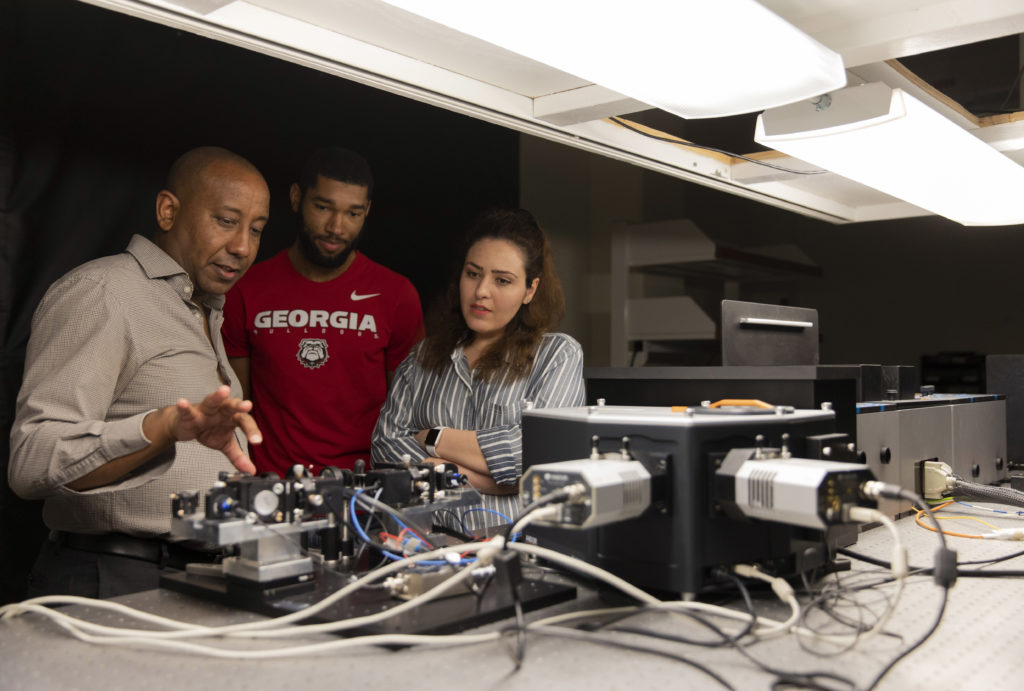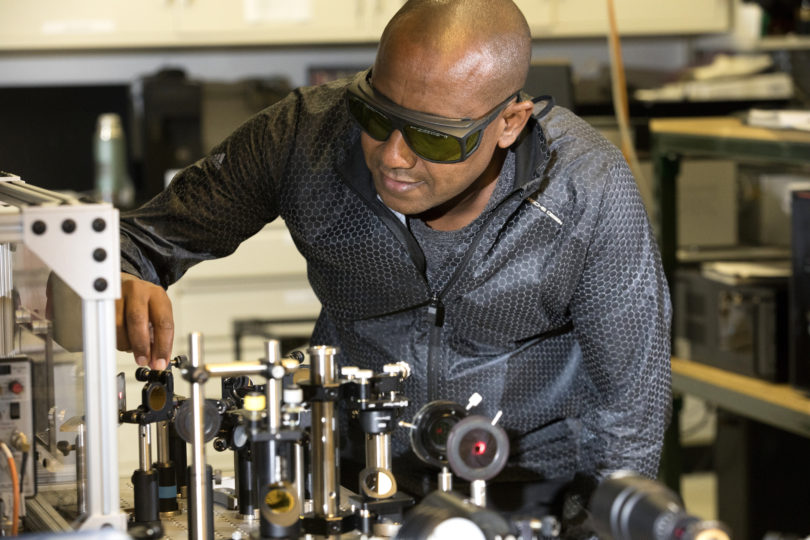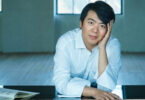Yohannes Abate, an associate professor of physics in the Franklin College of Arts and Sciences, studies the fundamental properties of nanoscale materials to lay the foundation for advanced optical and electronic technologies.
Where did you earn degrees and what are your current responsibilities at UGA?
I earned my bachelor of science degree in physics at Addis Ababa University in Addis Ababa, Ethiopia. I received an M.S. in physics from the National Institute of Physics, University of the Philippines at Diliman in the Philippines. I came to the U.S. for graduate school in 2001 and I received my Ph.D. in physics at the University of Iowa in 2006. From 2006-2009, I was a postdoctoral research fellow at the University of California, Berkeley and Lawrence Berkeley National Laboratory. Before joining the UGA faculty, I was a member of the faculty at Georgia State University (2014-2017) and California State University Long Beach (2009-2014). I am currently an associate professor of physics here at UGA. My research area is in experimental condensed matter physics, in particular quantum- and nano-optics, focusing on light-matter coupling and elementary interactions at subwavelength scale. I teach undergraduate and graduate courses in physics.
When did you come to UGA and what brought you here?
I came to UGA as an associate professor of physics in the Franklin College of Arts and Sciences in August 2017. UGA provided me with excellent research and teaching opportunities. These included generous startup funds and a large laboratory space. The collegiality and collaborative atmosphere at UGA is something I very much value. I knew some of the faculty at UGA even before I came here, so I was very pleased when I received the offer from UGA. Last but not least, my family and I love Athens.
What are your favorite courses and why?
I am a physics nerd and like to teach physics at all levels, from introductory to advanced courses. Teaching introductory general physics courses offers the opportunity to expose students to the basic workings of the universe in the simplest way possible. I enjoy teaching such courses using in-class demonstration experiments. I think demonstrations enable elaboration of concepts that are sometimes counterintuitive and leave lasting impressions on students. When I teach advanced courses, I like to connect my research with my teaching, which is quite interesting and useful for my own learning as well as for my students. It’s hard to choose one course as a favorite, but I would say that physics of the small length scale (quantum scale) is more fun to teach.
What are some highlights of your career at UGA?
With the generous startup funds UGA provided me, I have set up one of the best quantum/nano-optics laboratories that hosts some of the most contemporary and high-end research equipment. My research group is well-funded, and currently several exciting projects are ongoing around the research theme of light-matter interaction at a very small scale. Recently in a work published in Nature Communication, we have shown novel ways of controlling light at the nanometer scale. We are pushing the limit of control to a single photon level. Another exciting direction is the ability to manipulate and quantify highly localized charges, as we have demonstrated in our collaborative work published in Proceedings of the National Academy of Sciences. We are finding some striking properties of phase change materials and harmoniously dancing electrons that offer exciting hunting grounds for new physics in the years to come.
How do you describe the scope and impact of your research or scholarship to people outside of your field?
My laboratory is interested in exploration of fundamental physical phenomena and elementary interactions in very small (nanoscale) materials toward developing technologically useful systems. We develop unique ways of confining light below a size limit that is beyond the reach of any optical lenses, and we use these techniques to visualize individual nanoscale systems and their interactions. My research will advance our fundamental understanding of basic properties of nanoscale materials that are at the heart of modern emergent electrical and optical material systems. For example, one of my current funding sources is from the Air Force Office of Scientific Research, and the focus is on fundamental nanoscale materials physics toward developing high-speed electronics. My funding from the National Science Foundation (an NSF CAREER grant) is for exploring electronic and optical properties of low-dimensional emergent material systems that have huge potential for new types of optoelectronic devices. In the center of my research and integrated education plan is to promote undergraduate and graduate nanoscience and nano-optics education at UGA.
How does your research or scholarship inspire your teaching, and vice versa?
I deliberately aim to integrate my research activities into meaningful theoretical and practical exercises that introduce cutting-edge technologies in formal undergraduate and graduate courses. I often use examples and ideas from my current research to elaborate concepts in my teaching; hardly a class passes by that I do not talk about the research we are doing. I find this method of teaching to be an excellent and inspiring way to introduce students to modern research beyond textbook knowledge. This semester I am teaching thermodynamics to undergraduate senior physics majors. My research touches on several concepts covered in the course, such as discussions about phase change materials, how very low temperatures are achieved, and novel properties of matter at extremely low temperatures. It has been an exciting semester for that reason. The benefits are similarly mutual; I learn from the classes I teach and the interaction with our very talented students.

Associate professor Yohannes Abate talks with graduate students Marquez Howard and Neda Aghamiri about equipment used for nanoscale imaging and spectroscopy in his lab. (Photo by Andrew Davis Tucker/UGA)
What do you hope students gain from their classroom experience with you?
I want the students to learn the material deeply, whatever course I am teaching. I want students to be able to think physically (relate mathematical, abstract concepts to physical reality) and vice versa (express physical reality mathematically). That is really what physics is all about.
Describe your ideal student.
Interested, focused, imaginative and hard working, strictly in this order.
Favorite place to be/thing to do on campus is…
The UGA campus is beautiful, particularly around this time of the year (spring). I like to walk around campus a lot. I make sure to check out the coffee shops we have on campus at least once a day.
Beyond the UGA campus, I like to…
Read widely, play soccer and spend as much time as possible with family.
Community/civic involvement includes….
My family and I go to a small church in Athens and as a family we are active in our church, leading Bible study and fellowship groups. Also, two of my kids (12 and 8 years) are turning out to be excellent cellists, so we follow them around for performances.
Favorite book/movie (and why)?
Lately I have been interested in the writings of the original members of the Inklings, a group of writers who used to meet regularly in the 1930s and 1940s at Oxford University. Of these, the famous ones are C.S. Lewis and J.R.R. Tolkien. I like any of the books by these authors and films made based on their works. My favorite would be the Space Trilogy (a series of science fiction novels) by C.S. Lewis.
The one UGA experience I will always remember will be…
This happened in my first year at UGA; it was a day before we played Alabama Crimson Tide for the National Championship. I promised my calculus-based physics students, mostly engineering students, that if we win the game I will buy everyone coffee (a class of 50 students!). Fast forward, a day after The Game that we lost, I walked into the classroom, the class was dead silent. Everyone was in a super-quiet mood; it was as if everyone in the class had lost someone important to a disaster. That was a wake-up call for me—football is serious business at UGA!







